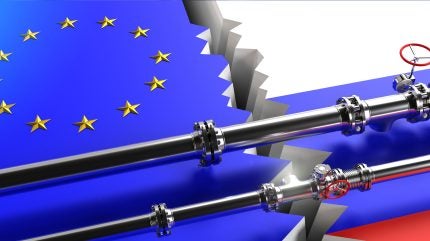
Despite introducing an array of new measures and polices, the EU is still not fully prepared for a future natural gas supply crisis, according to research by the European Court of Auditors (ECA).
Europe’s energy supplies were severely disrupted throughout 2022 following Russia’s invasion of Ukraine, resulting in reduced deliveries and gas usage.

Discover B2B Marketing That Performs
Combine business intelligence and editorial excellence to reach engaged professionals across 36 leading media platforms.
The invasion also forced the EU to look for alternatives for Russian gas, something the bloc had come to see as a source of relatively cheap and reliable energy.
In 2021, Russian natural gas accounted for more than 40% of all EU gas imports.
The ECA said on Monday that even though Europe managed to avoid sustained gas shortages during the crisis, it is still unclear how much of that was the result of specific EU policies, or other factors such as mild winter weather and higher prices prompting less gas use.
According to Reuters, citing the report from the body, which acts as the bloc’s independent external auditor, better coordination between EU countries helped to forge new gas supply routes and storage areas.

US Tariffs are shifting - will you react or anticipate?
Don’t let policy changes catch you off guard. Stay proactive with real-time data and expert analysis.
By GlobalDataIn addition, the EU is now requiring member nations to fill gas storage to 90% ahead of winter, which the report said has created a degree of market certainty.
However, the auditors said these actions did not sufficiently address the affordability of gas, which by August 2022 has risen fivefold from a year earlier on a megawatt hour basis.
The European Commission knew from 2014 onward that a “cut-off of Russian gas would have a huge impact on prices but never modelled its effects on consumers or industry”, said Joao Leao, the report’s lead author.
“The crisis… tested the EU’s resilience to a sudden change in the gas supply [and] although prices experienced a steep increase with significant costs for families and business, we were fortunate not to experience a major gas shortage,” Leao added.
“Given the EU’s dependence on foreign gas, it can never be complacent about its security of supply,” he said.
The report also highlighted that six EU countries still have the option to cut off gas deliveries to their neighbours in an emergency.
However, the report also noted that the EU’s overall reliance on Russia has dropped from more than 40% of total gas supplies in 2021 to around 15% in 2023.
Russia has faced an array of ever-growing international sanctions since its invasion of Ukraine, including on the importation of various hydrocarbons and its so-called shadow shipping fleet.
As a result, Russia has begun to look elsewhere for new markets, including a recent dalliance with Vietnam.
There is also a question mark over the overall effectiveness of the sanctions, given that Russia’s annual oil proceeds almost doubled in May.
Its oil-related taxes rose to Rbs632.5bn ($7.1bn) just last month, based on Finance Ministry data. Meanwhile, total oil and gas proceeds increased 39% on the year to Rbs793.7bn, the ministry added.





